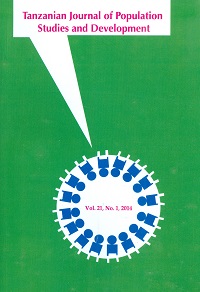The Impact of Foreign Direct Investments on the Economic Growth of Developing Countries: Some Empirical Evidence from Tanzania
Abstract
The role of Foreign Direct Investment (FDI) has been widely recognized as a growth-enhancing factor. These flows enable host countries to achieve investment levels beyond what their own domestic savings can allow. Consistent with the ' gap ' models which have followed the Harrod €“Domar tradition, FDI is expected to bridge the savings, foreign exchange, technology or any other gaps said to impede most developing countries from achieving the desired levels of economic growth. In a typical less-developing country like Tanzania, savings are so low they cannot finance the investment needed. Likewise, the inflows of foreign exchange are too small to finance the imports of capital goods needed. More importantly, FDI is an important means of transferring modern technology and innovation from developed to developing countries.
This article analyzes the role of FDI in promoting economic growth through improvement of trade in Tanzania. Using macroeconomic data from various institutions in Tanzania, and employing a model in which growth is influenced by factors such as FDI, trade, inflation, employment and a combination of factors like human capital and FDI, the study has shown among other things that FDI flows enhance economic growth in recipient countries.
However, the study also shows that factors like human capital and trade do not have the expected positive impact on a country ' s growth. This suggests that there is need for institutional stabilization policies and other ' conditioning factors ' for FDI driven growth to materialize. Some of the ' conditioning factors ' needed for FDI to have the desired growth enhancing impacts include expansion of education opportunities from primary to tertiary levels, targeting inflation, and reducing the tax burden.
References
Aitken, B., & A. Harrison. 1999. Do Domestic Firms Benefit from Direct Investment? Evidence from Venezuela. American Economic Review, Vol. (89) 3.
Bank of Tanzania (BoT). 1980. Economic and Operations Reports, June 1980 €“1981.
€”. 1996. Economic and Operations Report for the year ended 30th, June 1996.
Barrell, R., & N. Pain. 1996. An Econometric Analysis of U.S. Foreign Direct Investment. Review of Economics and Statistics, 78: 200 €“7.
Blomström, M., & A. Kokko. 1998. Multinational Corporations and Spillovers. Journal of Economic Surveys, Vol. 12.
Borensztein, E., J. De Gregorio, & J. Lee. 1998. How Does Foreign Direct Investment Affect Economic Growth? Journal of International Economics, 45: 115 €“35.
De Mello, L.R. 1997. Foreign Direct Investments in Developing Countries and Growth: A Selective Survey. Journal of Development Studies 34: 115 €“35.
Dollar, D. 1976. Outward Oriented Developing Economies Really Do Grow More Rapidly: Evidence from 95 LDCs 1976 €“85. Economic Development and Cultural Change, 40: 523 €“44.
Feder, G. 1983. On Exports and Economic Growth. Journal of Development Economics, 12: 59 €“73.
Fisher, S., & F. Modigliani. 1978. Towards an Understanding of the Real Effects and Costs of Inflation. Weltwirtschaftliches Archiv, 4: 810 €“33.
Frankel, J.A., & D. Romer. 1991. Does Trade Cause Growth? American Economic Review, 1999:379 €“99.
Froot, K.A., & J.C. Stein. 1991. Exchange Rates and Foreign Direct Investment: An Imperfect Capital Markets Approach. Quarterly Journal of Economics, 106: 1191 €“217.
Görg, H., & D. Greenway. 2003. Do Domestic Firms Really Benefit from Foreign Direct Investments? Discussion Paper series, IZA DP No. 944
Greene, W. 1990. Econometric Analysis. 1990. New York: Macmillan Publishing Company.
Greenway, D., N. Sousa, & K. Wakelin. 2001. Do Domestic Firms Learn to Export from Multinationals? Leverrhulme Centre for Research on Globalization and Economic Policy, Research Paper No.11.
Grossman, G.M., & E. Helpman. 1991. Innovation and Growth in the Global Economy. Cambridge: The MIT Press.
Kokko, A. 1992. Foreign Direct Investment, Host Country Characteristics and Spillovers. EFI, Stockholm School of Economics, Stockholm.
Lipsey, R. 2002. Home and Host Country Effects of FDI. Working Paper, National Bureau of Economic Research, Cambridge, MA.
Lipsey, R.E., & F. Sjöholm. 2001. Foreign Direct Investment and Wages in Indonesian Manufacturing. NBER Working Paper 8299.
Meir, G. 1995. Private Foreign Investment in Developing Countries: Policy Perspectives, Occasional Papers, No. 59 International Centre for Economic Growth. California: ICS Press.
National Bureau of Statistics. 1995. National Accounts of Tanzania 1976 €“1995, Gross Domestic Product at Constant 1976 Prices Absolute Values. Eleventh edition.
Ram, R. 1985. Exports and Economic Growth: Sine Additional Evidence. Economic Development and Cultural Change, 33: 415 €“52.
Rodriguez, F., & D. Rodrik. 1999. Trade Policy and Economic Growth: A Skeptic's Guide to the Cross-Country Evidence. Working Paper, National Bureau of Economic Research, Cambridge, MA.
Sachs, J., & A. Werner. 1995. Economic Reform and the Process of Global Integration. Brookings Papers on Economic Activity 1: 1 €“118.
Salisu, V., & D. Sapsford. 1996. Foreign Direct Investment and Growth in EP and IS Countries. Economic Journal, 106: 92 €“105.
Salvatore, D., & T. Hatcher. 1991. Inward Oriented and Outward Oriented Trade Strategies. Journal of Developmental Studies, 27: 7 €“25.
Solow, R.M. 1957. Technical Change and the Aggregate Production. Review of Economics and Statistics, 39: 312 €“20.
United Republic of Tanzania (URT). 1980-2005. Economic Surveys, Various issues.
€”. 2004. Tanzania Investment Report.
€”. 1996. Tanzania Investment Policy. Dar es Salaam: Government Printer.
€”. 1997. Tanzania Investment Act. Dar es Salaam: Government Printer.
€”. 2001. Tanzania New Foreign Policy. Dar es Salaam: Government Printer.
€”. 2003. Tanzania National Trade Policy. Dar es Salaam: Government Printer.
€”. 2004. Annual Operations Report, Bank of Tanzania. Dar es Salaam: Government Printer.
Velde, Te D.W. 2002. Foreign Direct Investment for Development ,policy and challenges for sub Saharan African countries, Overseas Development Institute, London.


